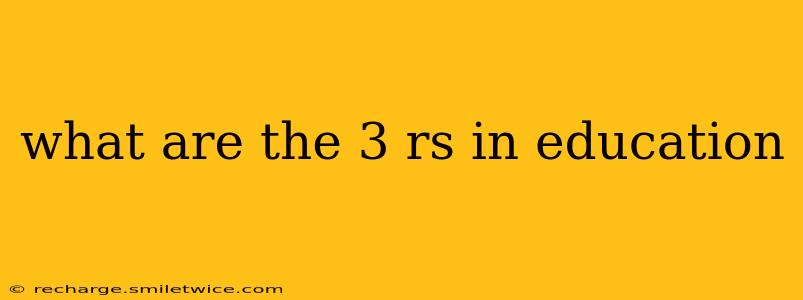What Are the 3 Rs in Education? And Why They Still Matter Today
The "3 Rs" in education—Reading, wRiting, and aRithmetic—represent the foundational skills considered essential for literacy and numeracy. While the modern educational landscape has expanded far beyond these basics, understanding their enduring importance remains crucial. This post will delve into each "R," explore their modern relevance, and address common questions surrounding their role in a 21st-century education.
What is the importance of Reading in education?
Reading is the cornerstone of learning. It's the gateway to accessing information, fostering critical thinking, and building vocabulary. Proficient reading unlocks a world of opportunities, from understanding complex texts in higher education to navigating everyday life. Beyond decoding words, reading cultivates comprehension, analysis, and interpretation skills, vital for success in any field. The ability to read efficiently and critically is paramount for lifelong learning and personal growth.
What is the importance of Writing in education?
Writing is more than just spelling and grammar; it's about communication, expression, and articulation of ideas. Through writing, students learn to organize thoughts, construct arguments, and convey information effectively. It's a skill used throughout life, from writing emails and reports to crafting compelling narratives and persuasive arguments. Strong writing skills are crucial for success in various professional fields, fostering clear communication and confident expression.
What is the importance of Arithmetic in education?
Arithmetic, the foundation of mathematics, equips individuals with the fundamental skills of counting, calculating, and problem-solving. It's not simply about memorizing multiplication tables; it's about developing logical reasoning, analytical thinking, and the ability to apply mathematical concepts to real-world situations. A strong foundation in arithmetic is critical for success in higher-level mathematics and STEM fields, as well as for everyday tasks like managing finances and understanding data.
Are the 3 Rs still relevant in today's education?
Absolutely! While the curriculum has evolved to include technology, critical thinking, and creativity, the 3 Rs remain fundamental building blocks. They provide the literacy and numeracy skills necessary to acquire and apply knowledge effectively. Modern education builds upon this strong foundation, integrating technology and other essential skills, but the 3 Rs continue to be the bedrock of successful learning.
What other skills are important besides the 3 Rs?
While the 3 Rs are foundational, today's education rightly emphasizes a broader range of skills, including:
- Critical thinking: Analyzing information objectively, identifying biases, and forming reasoned judgments.
- Creativity and innovation: Generating new ideas, exploring diverse perspectives, and solving problems creatively.
- Collaboration and communication: Working effectively in teams, sharing ideas, and communicating clearly and persuasively.
- Technology literacy: Utilizing technology effectively and responsibly, understanding its applications and limitations.
- Problem-solving: Identifying problems, developing solutions, and evaluating their effectiveness.
How have the 3 Rs changed over time?
The 3 Rs haven't remained static. Their implementation has evolved to reflect changes in pedagogy and technological advancements. For example, reading instruction now incorporates diverse approaches to cater to different learning styles, while arithmetic education focuses on conceptual understanding and problem-solving rather than rote memorization. The core principles remain, but the methods of teaching have been refined for improved effectiveness.
In conclusion, while the educational landscape has broadened, the 3 Rs – Reading, Writing, and Arithmetic – retain their critical role as fundamental building blocks for lifelong learning and success. These foundational skills, coupled with modern additions like critical thinking and technological literacy, empower individuals to thrive in the 21st century and beyond.
